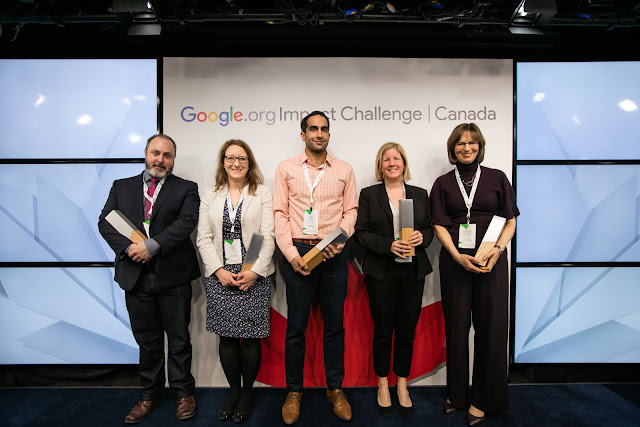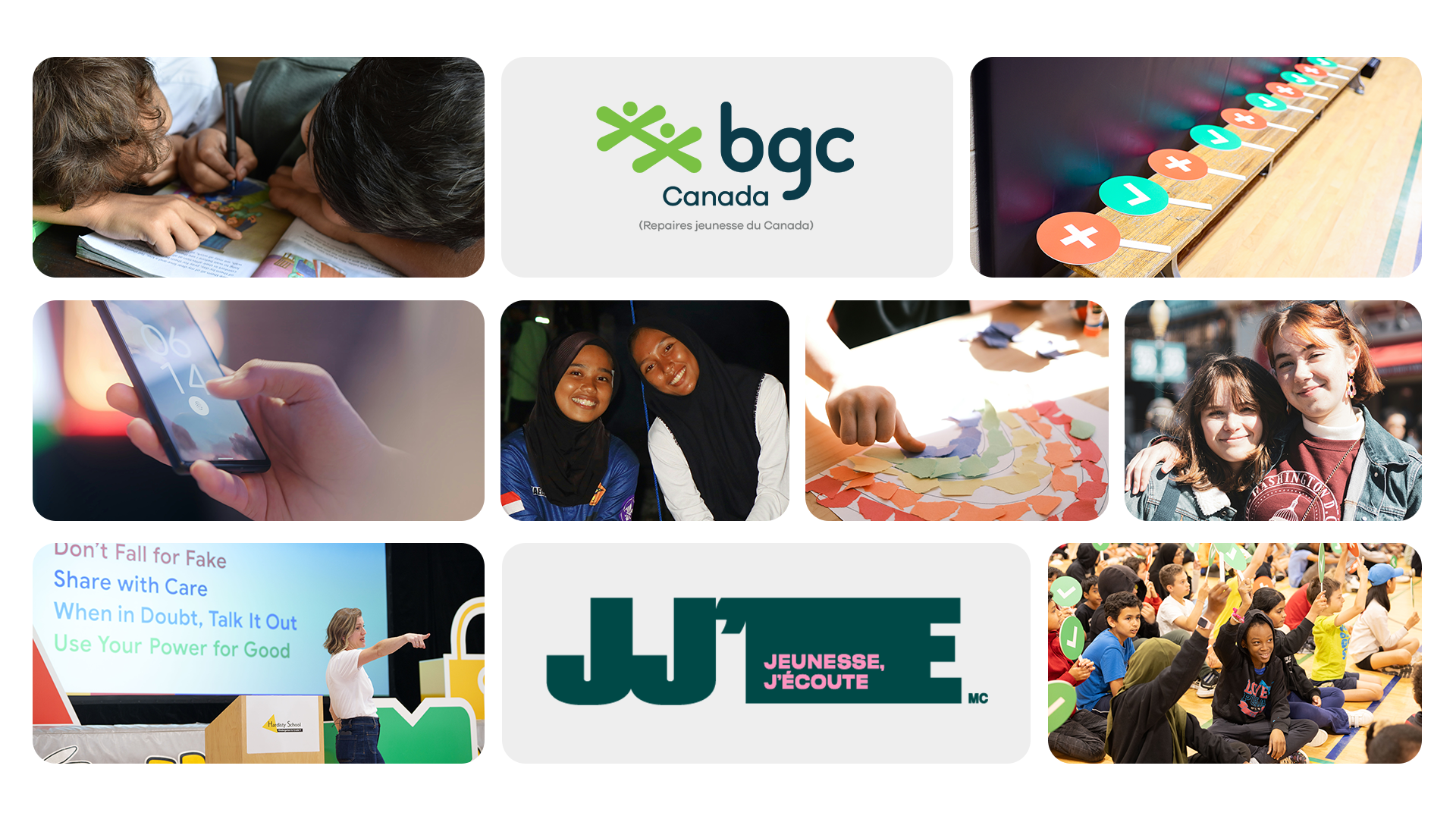Meet the winners of the Google.org Impact Challenge
Necessity is the mother of invention, so the saying goes. But what about when it comes to difficult, global problems - tough challenges like poverty, hunger, and disease? How do you innovate when the need is urgent and overwhelming?
That was the task we put to Canadian nonprofits when we kicked off Canada’s first Google.org Impact Challenge, a nationwide competition to find and fund organizations that are using technology to make the world a better place. More than 900 applications poured in - more applications than we had in France, the UK and Australia combined.
Winners of the Google.org Impact Challenge, left to right: Joel Heath, Arctic Eider Society; Audra Renyi, World Wide Hearing International; Tariq Fancy, The Rumie Initiative; Renee Black, PeaceGeeks; and Katherine Schmidt, Food Banks Canada Today, we selected the winners of the Challenge in a live competition adjudicated by a panel of esteemed Canadian leaders in both philanthropy and technology.

In total, we’re announcing $5M in grants to Canadian nonprofits across 10 different organizations.
Five winning projects will each receive $750K in grant funding from Google, alongside hands-on support from both Google and our local support partner, the LEAP Centre, for the next year to help them bring their projects to life. The remaining five projects will receive $250K in funding from Google, along with the same support program.
Winning Projects - $750K:
- The Rumie Initiative - Only 40% of students on indigenous reserves graduate from high school, compared to 90% of students in the rest of Canada. The LearnCloud Portal is an offline, tablet-based curriculum to help high school students learn about Indigenous culture, history and language while gaining employment skills and financial literacy.
- World Wide Hearing Foundation International - Globally, 32 million children suffer from significant hearing loss, the majority of whom live in countries where access to hearing care can be a significant barrier. The Teleaudiology Cloud will connect children living in remote communities with audiologists and speech therapists who can assist with remote screening, hearing aid fitting, speech therapy and parent counselling.
- Arctic Eider Society - With Arctic sea ice declining at over 13% per decade, changing conditions make navigation unpredictable and limits access to traditional foods for Arctic communities. The SIKU platform will provide a set of open-source tools that help Inuit communities map changing sea ice, and build a living archive of Inuit knowledge to help inform decision making for stewardship and sustainable development.
- PeaceGeeks Society - It can take up to ten years for the employment rate of recent immigrant cohorts to reach the equivalent rates for those born in Canada. With information provided in their native language, Services Advisor is an application aimed at welcoming new Canadians to our shores, making it easier for newcomers to access immigrant services like mentorship and employment skills.
People’s Choice Award, selected by nearly 500,000 votes
- Food Banks Canada - Each year, close to $31 billion of food is wasted in Canada, yet nearly one in ten Canadian households have to worry about whether they have food on the table. The FoodAccess App diverts surplus quality food away from landfill by connecting farmers, manufacturers and restaurants with donation agencies and Canadian dinner tables that might otherwise go empty.
Finalist Projects - $250K:
- British Columbia Children’s Hospital Foundation - Globally, pneumonia is the single largest cause of death among children under five. The PocketDoc for Pneumonia is a mobile platform to accurately diagnose pneumonia in the developing world and save children’s lives.
- GlobalMedic - In the chaos after an earthquake or a tsunami, every minute counts. The RescUAV project will use Canadian-made Unmanned Aerial Vehicles to fly over disaster areas, allowing emergency responders to see the terrain they are heading into and help them get aid to where it’s needed most.
- Victoria Hand Project - Only 5% of the 40 million people who need prosthetic care can access the resources they need. The Victoria Hand Project will provide affordable 3D-printed prosthetics in low-to-mid income countries.
- Growing North - In Nunavut, nearly 70% of adults are food insecure - meaning they lack reliable access to a sufficient quantity of affordable, nutritious food. Growing North addresses food insecurity issues by building greenhouses that will provide fresh produce all year round in latitudes above the Arctic Circle at about half of the present cost.
- Canadian Red Cross - The Register Educate Deliver System (REDS) system will take a pilot project developed in the days following the Fort McMurray Wildfire and scale it so it’s ready for the next big disaster. The program registers those affected, shares critical information about how to respond, and quickly delivers financial assistance into the hands of Canadians when they need it most.
At Google.org, we believe that the best ideas positively impact as many people as possible. We look for leaders who have bold, ambitious ideas. They open source their technology. They build models with the potential to scale. They speak publicly about their successes and failures so that others can learn and benefit. We are excited to work alongside each of these Canadian nonprofits to help them bring their ideas to life.
We have learned something important about Canada throughout this Challenge. In Canada, there are a whole lot of innovators who understand the needs of underserved populations, and who are ready to create new and unexpected solutions to address inequities. This is a country with humanitarianism and innovation baked into its DNA, and that comes out in these big ideas that will make the world better through technology.
The future belongs to Canada, a country whose capacity for innovation is matched only by the generosity of its people.





